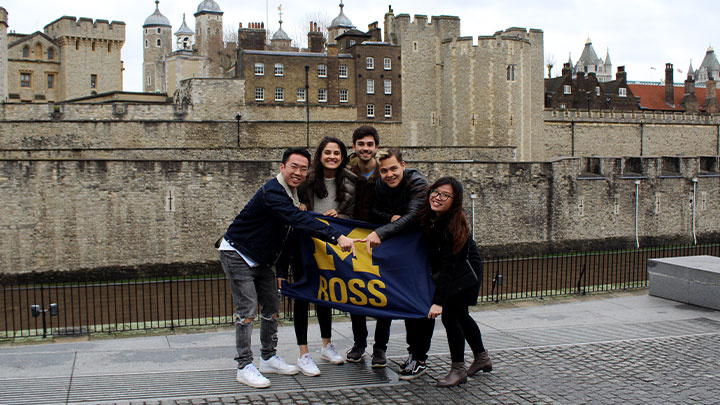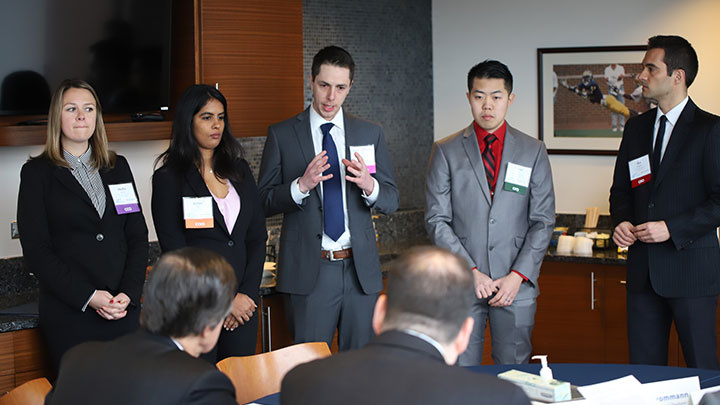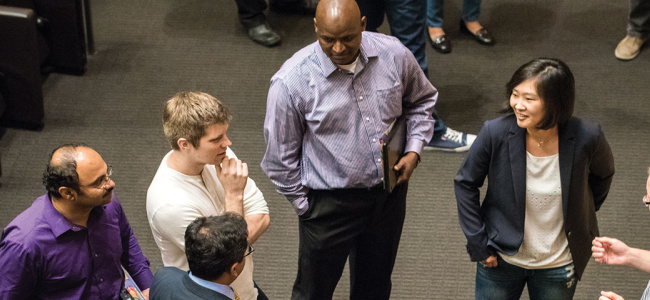Accelerate your path to senior leadership through a combination of rigorous fundamentals, action-based learning, and immersive experiences. Three global leadership experiences and a global semester abroad provide opportunities to strengthen your leadership skills and expand your network.
Hone your ability to effectively manage teams and drive change in global business contexts through a progression of three global leadership experiences. Each experience offers a different way in which to develop your skills.
Develop your leadership skills while expanding your understanding of the global business environment. This session includes a series of workshops facilitated by Michigan Ross professors, content experts, and our world-renowned Sanger Leadership Center to help you lead teams across cultures and continents.
Put your learning into practice during our signature Multidisciplinary Action Projects course, the epitome of the Michigan Ross commitment to action-based learning. Over seven weeks, you'll work with a team to devise a creative solution to a critical organizational challenge at a sponsoring company. Projects may involve travel to locations inside or outside the United States. Regardless of travel, all projects will involve global thinking.
The Ross Global MBA offers two field studies - one week abroad and one week in the U.S. - giving you the opportunity to gain a comprehensive understanding of business and cultural customs. Onsite classroom instruction is facilitated by Michigan Ross faculty and complemented by visits to companies in various sectors, lectures from faculty in the region, and interactions with local students and U-M alumni.
Complete your Global MBA degree requirements in just 16 months. Move through core courses in two-week sprints to accelerate your path to electives and a global semester abroad.
January - February 2024
Global Leadership Foundations
Financial Accounting - ACC 591
Applied Business Statistics - TO 595
Applied Microeconomics - BE 591
March - April 2024
Corporate Strategy - STRATEGY 591
Financial Management - FIN 591
Spring: May - Mid-June 2024
Global Leadership Field Study (U.S.)
Operations Management - TO 593
Leading People and Organizations - MO 593
Competing in the Global Business Environment - STRATEGY 503
Summer: Mid-June - August 2024
Multidisciplinary Action Projects (MAP) - BA 591
Late August - December 2024
Elective Courses/Degree Requirements
Business Law Requirement - Choose at least one approved course
Global Leadership Field Study (International)
Satisfy the Michigan Ross Management Communication Competency requirement through testing or through coursework.
January - May 2025
Global Semester Exchange
Study abroad at one of our 20+ partner institutions. Choose to study abroad for a full term for up to 15 credits or choose to study for a half-term for up to nine credits and enroll in Ross winter elective courses upon return.
-or-
Elective Courses/Degree Requirements at Michigan Ross in Ann Arbor

Enrich Your Experience with a Semester Abroad
Further your understanding of international business during a semester abroad at one of our distinguished partner schools during your fourth term. Learn about business from diverse perspectives, experience other cultures, and network with students, faculty, and business professionals from around the world. Choose to study abroad for seven weeks (for up to nine elective credits) or for the full 14-week term (for up to 15 elective credits).

Stand Out with a STEM Designation
Be ready to lead in any quantitative management or business analytics role — and differentiate yourself in the job market — with the Ross STEM-Designated Specialization in Management Science. A variety of STEM-designated courses allow you to customize your study to your interests.
Pair your general management studies with another area of interest through dual degrees, concentrations, certificate programs, and other specializations. From healthcare to social impact to data analytics (and more), we make it easy to prepare for the exact career you want.

Develop Your Signature Leadership Style
Explore diverse approaches to leadership, identify your strengths and gaps, and surface personal leadership biases or tendencies with workshops and events from our Sanger Leadership Center, the hub for leadership at U-M.
Enhance your MBA with a comprehensive, self-directed research project that integrates all you've learned and provides an opportunity to immerse yourself in a topic relevant to your employer or to your career goals. Students completing the Global MBA with a GPA of 2.5 or above are invited to apply for a post-MBA research project, offered for seven or 14 weeks in the fall term following graduation.
| Early March 2024 | Prepare a research plan and initiate a discussion with an advising professor to obtain approval to participate. |
| March 2024 | Submit a research plan and application with faculty consent to the Global MBA Program Office for approval. |
| April-June 2024 | Approved students who required a student visa to earn their MBA must individually apply for Optional Practical Training (OPT) following guidelines from the University of Michigan International Center. |
| Aug. 31, 2024 | Submit project fee: $1,000 for the seven-week project and $2,000 for the 14-week project. |
| Sept.-Oct./Dec., 2024 | Conduct research under the guidance of advising faculty. |
| Oct./Dec. 2024 | Present the results of your research to your advising faculty and then put those results to work for you. |





